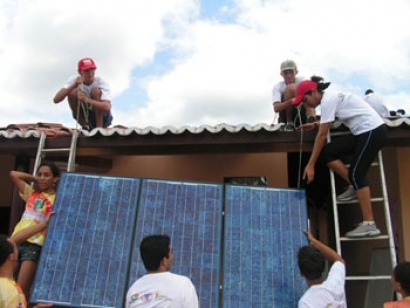
The norm establishes the Energy Compensation System, which allows consumers to install small generators in their consumer units and exchange electricity with the local distributor. The rule applies to generators that use incentivized energy sources (hydro, solar, biomass, qualified cogeneration and wind).
Under this new system, a generating unit installed in a residence, for example, will produce power and the power not consumed will be injected into the distribution system, which will register credit to be applied to the consumption rate of following months. These credits will then be available for use within a period of 36 months. Credit information will also be included in the invoice to the consumers, so that they can track the balance of power and be able to better manage their electricity bills.
Public agencies and companies with subsidiaries that choose to participate in the compensation system may also use the exceeding electricity produced in one of their facilities to reduce the bill of another unit.
Consumers who install distributed (micro or mini) generation will initially be responsible for the costs of adapting the measurement system required to deploy the compensation system. After the adaptation, the distributor will, in return, be responsible for its maintenance, including the costs of eventual replacement.
In addition, distributors will have up to 240 days after the publication of the resolution to prepare or review the technical standards to access the small generators, taking current regulations, Brazilian norms and eventually international norms into account.
Generating electricity close to the place of consumption or at the consumer facility brings a number of advantages over traditional centralised generation. For example: reduction of transmission costs, reduction of losses in the networks and improvement of the quality of the electricity supply.
The new rules target generators using renewable energy sources, and with that, the agency hopes to provide better conditions for the sustainable development of the Brazilian electricity sector through the adequate use of natural resources and efficient use of electrical networks.
The new system was developed after consultation and a public hearing, with a total of 403 contributions from agents in industry, universities, manufacturers, associations, consultants, students and politicians.
TUSD and TUST discounts
Besides the Power Compensation System, ANEEL has also approved new rules for discounts on the Distribution System Usage Tariff (TUSD) and the Transmission System Usage Tariff (TUST) for larger plants (up to 30 MW) using solar power:
• Enterprises that enter into commercial operation by 31 December 2017 will have the discount of 80% applied to the tariffs during the first 10 years of operation.
• The discount will be reduced to 50% after the tenth year of plant operation.
• For the enterprises entering into commercial operation after 31 December 2017, the 50% discount on the tariffs will be maintained.
Meanwhile, rumours last week that the Brazilian federal government is planning a mass auction of solar plant construction concessions were quelled by the Government. The administration said that solar kilowatt costs were still three or four times too high to complete with other renewables.
That said, state officials did say that solar auctions could begin in a few years’ time as solar costs fall.
Despite no immediate auction of new solar capacity, several Brazilian utilities are already rolling out their first solar plants and will soon be auctioning off the power produced by these facilities on the unregulated commercial market for electricity.
[Editor's note: Thanks to FC Solar for contributing to this piece]
For additional information:

